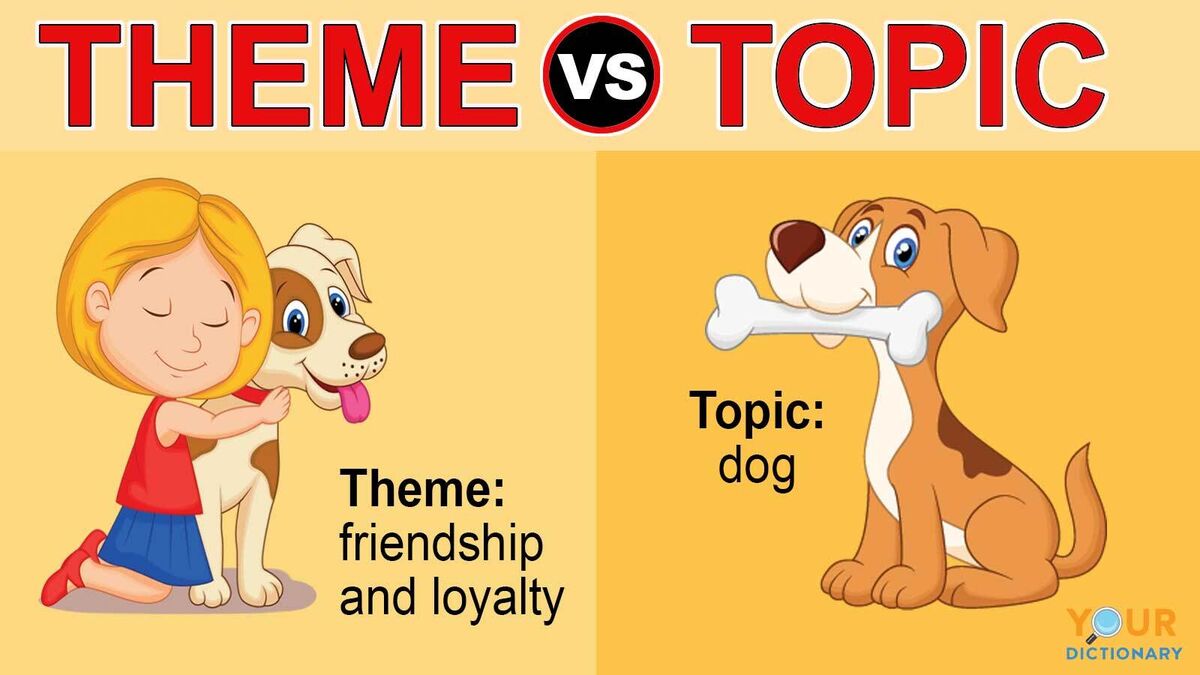
When you are new to writing, you might think the theme and topic of a piece of literature or a play are the same. However, there are differences between topic and theme. Get a clear understanding of theme vs. topic through a definition, examples and a chart.
Theme vs. Topic Explained
Theme and topic within a piece of writing can get easily confused. And many people think that they can be used interchangeably. However, theme and topic are connected but distinctly different in a piece of literature. To truly see the difference between topic and theme, just look at their definitions.
- theme - an implicit message found throughout a work of literature (think central message)
- topic - the explicit subject matter of the book
At face value, you can see the difference between these two concepts.
Key Differences Between Topic and Theme
Keep the difference between topic and theme clear by looking at this simple chart.
Topic | Theme | |
Definition | what the book, poem or paper is about | central message or concept of the work |
How it's expressed | clearly stated | implied |
Scope | explains what the piece is about | clarifies why a piece of writing or literature was made |
Nature | unique to piece | universal |
Specificity | describes subject matter | reflects opinion |
With a clear understanding of how these two concepts differ, it’s time to look at each one in more detail.
What Is a Topic?
As stated, the topic is the main subject of your work. It quickly answers the pivotal questions of who, what and why. Since the topic can answer these questions, it is clearly defined through specifics and facts. A few questions you can ask yourself to find a topic include:
- Who is the main character?
- What are they trying to do?
- What happens?
- Where does the book take place? (location, time period)
- What are some hardships the character must overcome?
The topic of a work is relatively easy to find by reading the work’s synopsis on the book jacket or online.
Examples of Topic
The best way to understand this is to look at a few examples in literature.
- The topic of Charlotte Bronte’s Jane Eyre is the growth of a woman as she becomes an adult.
- The topic of Jane Austen’s Pride and Prejudice was to showcase the expectations of women in the 1800s.
- Suzanne Collins' The Hunger Games follows a girl’s growth in a dystopian future as she fights to beat the odds.
One book can cover several different topics. Additionally, as you read a story, more topics might come to the forefront.
What Is Theme?
The theme is a bit harder to discern from a book, play or paper. Why? Because the theme doesn’t hit you in the face as a topic does. Instead, it’s buried snuggly within the pages of your book and you have to seek it out. Once you finish the work, you understand the theme of it. However, you’ll find both major and minor themes throughout the piece. For example:
- Pride and Prejudice has a major theme of matrimony. Throughout the story, you see it repeatedly as Mrs. Bennett is trying to marry her brood off. However, this work also has minor themes as well. These include love and friendship.
How Is Theme Expressed?
The novel’s theme can be harder to figure out because it’s implied through the characters’ thoughts, feelings and actions. As you read or watch the piece as a whole, you get an idea of the work’s underlying theme. For example, through the actions at the parties and the way the characters feel about marriage, you see the overarching theme of marriage in Pride and Prejudice.
Examples of Theme in Literature
There are all different themes found in literature. However, a few common ones include fear, love, friendship, coming of age, revenge, redemption, and good vs. evil. Explore a few examples of themes in action.
- A major theme of the Harry Potter series is death. You can see this through his parents’ deaths and the deaths of other main characters like Dumbledore, Sirius, Lupin, and Snape. Voldemort’s obsession with avoiding death through immortality shows this theme as well.
- One of the major themes of The Hunger Games is freedom vs. oppression. You can see this through the Capital’s oppression of the districts and how Coin tries to make this same mistake by oppressing the Capital.
- Jane Eyre has a major theme of gender roles. Given the novel’s timeframe, Jane has to work hard to get her voice heard and her independence recognized by those around her.
Using Theme and Topic in Your Writing
Theme and topic are two different devices used by a writer to create a work of fiction, nonfiction or other media. Knowing the distinction between topic and theme can help you become a better writer and reader. Now that you have a clear understanding of the theme and topic, dive into basic literary devices.